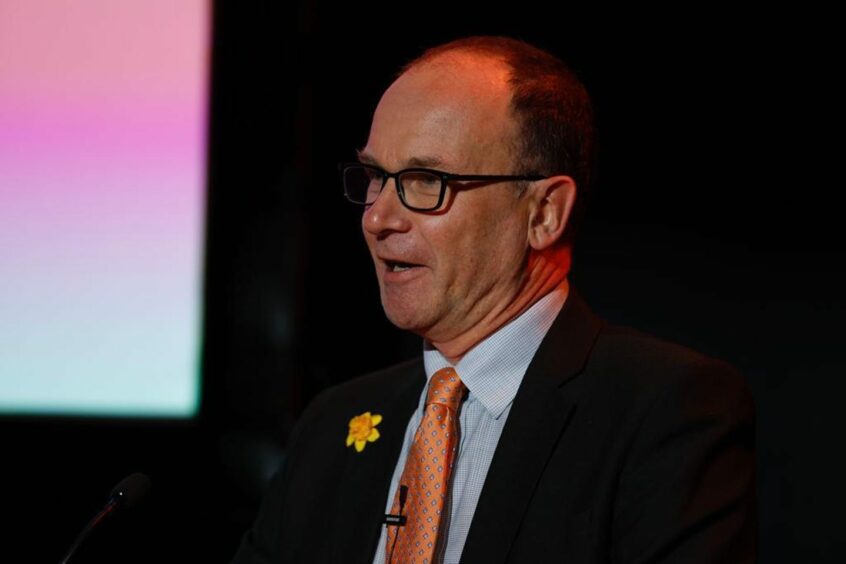With an increase in the tax imposed on North Sea oil and gas is considered “inevitable”, a speaker at a business event in Aberdeen called for the north-east region to be recompensed with a green free port to ensure jobs are retained and the transition to low carbon energy is achieved.
Managing partner at communications firm True North Geoff Aberdein said a decision on green freeports in Scotland was “imminent”.
Speaking at the launch of the Aberdeen and Grampian Chamber of Commerce’s 36th Energy Transition Survey, he said the North East Scotland Green Freeport bid had many strengths, but that these were also considered weaknesses.
“The fact we are already a global hub, the fact that we already foster an innovative environment and that we have created high value jobs may not be scored as heavily, because they are looking at new additionality – I think that is mistaken,” he said.
The long awaited decision on where the two green freeports will be based has been delayed by the recent political turmoil in Westminster, despite Scottish Secretary Alister Jack revealing more than a month ago that a decision had already been reached privately
Campaigners in both the north-east and the Highlands have waged a vociferous campaign to win the status which comes with tax breaks on investment and jobs.
He said:”We are facing a budget in which it is likely there will be an oil windfall tax.
“If I was engaging in a political strategy where I was about to extract further revenues from the north-east of Scotland, I’d be thinking how do we we offset that, how do we give them something in return?
“A green freeport would be a pretty good start.”
Nor does he think the region should stop pushing for the status, if other areas are made green freeports.
He said the group leading the bid should press for a solution recently called for by the Press and Journal, which is to go ahead with three green freeports.
He said: “If we are rejected I don’t think we give up there – I think we have to rapidly respond and encourage, lobby hard for an additional port to be awarded.”
A panel of speakers joined the event including KPMG office senior partner in Aberdeen Martin Findlay, who said that bolstering energy security and delivering a transition is “a lot to achieve with a high tax rate”.
It is thought the Chancellor Jeremy Hunt is likely to add a further 5-10% on tax, with the risk North Sea companies could be paying a 75% rate.
Mr Hunt is looking to find up to £60 billion from a combination of hikes and spending cuts in his autumn statement on Thursday.
From a “corporate perspective” it would be “much better” if firms were able to face up to the challenges of the day with lower levies and less volatility, Mr Findlay said.
But he acknowledged that it is “inevitable” that industry will remain a target for the Treasury, in view of the government’s deficit and the scale of profits oil and gas companies have reported in recent months.
Mr Findlay said: “It does look very likely that we will see an extension to the oil and gas windfall tax, and possibly a reduction in investment allowance on Thursday, as well as a new tax for electricity generators.
“The government is focussing on balancing its books, and the latest mantra seems to be that everyone and everything will be paying more tax. It is just inevitable that oil and gas will remain a target.”
Overcoming oil and gas bad reputation
Aberdeen University’s energy transition lead believes academia faces an uphill struggle in setting out the merits of the oil and gas industry to some students.
Professor John Underhill, a renowned geologist who joined the institution earlier this year, believes the sector suffers from an “image problem” that has been growing in recent months.
Fielding a question about the need to “educate some younger people” about the role of oil and gas in delivering the transition to a low carbon energy system following a protest in Aberdeen yesterday, he admitted its perception makes it “very difficult” for oil and gas companies to “get their message across”.
As such Professor Underhill, director of the university’s Interdisciplinary Centre for Energy Transition, believes the onus is on people like him to share “accurate data and facts” about the role of industry in the energy transition.
Speaking at the event he said: “It is difficult. I’m certainly not immune to criticism, public and private, for expressing some of the views that I have.
“I actually feel that my view is closer to many people who are protesting in different ways, in the sense that we would all like to get to net zero as soon as we can.
“Where I differ, and there are several ways, is the way in which one articulates that – I would prefer to be doing that with sound reason and evidence.
“It is absolutely key that we get the message across all the way through, from schools to the public, about the reality of where the starting point is.”
Earlier this week campaign group Just Stop Oil covered Aberdeen’s Silver Fin building in orange paint in a sign of “solidarity” with fellow activist group, Extinction Rebellion.
The Union Street offices houses Neo Energy and the primary target of the protest, Barclays bank – while oil giant, Shell, will move in soon.
They were subsequently arrested.




